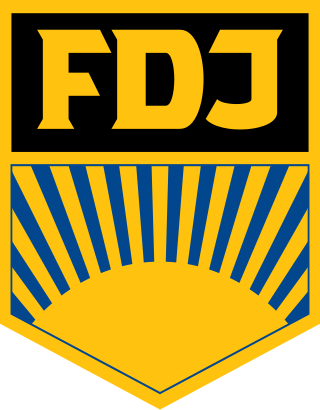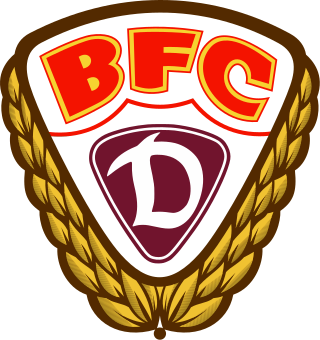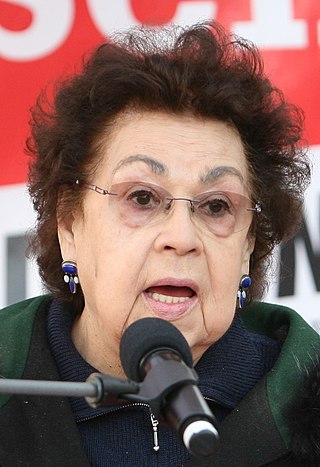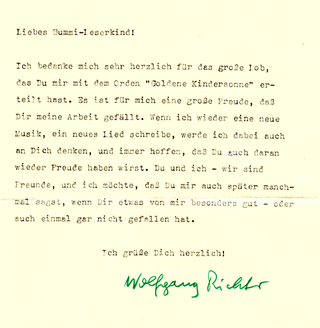 | |
| Categories | Children's magazine |
|---|---|
| Frequency | Monthly |
| Publisher |
|
| First issue | 1946 |
| Final issue | 1996 |
| Country | East Germany Germany |
| Language | German |
ABC-Zeitung was a German monthly children's magazine published between 1946 and 1996.
 | |
| Categories | Children's magazine |
|---|---|
| Frequency | Monthly |
| Publisher |
|
| First issue | 1946 |
| Final issue | 1996 |
| Country | East Germany Germany |
| Language | German |
ABC-Zeitung was a German monthly children's magazine published between 1946 and 1996.
Founded in 1946, ABC-Zeitung was the first children's magazine of East Germany, [1] and at one time it had a circulation of 885,000 copies.
Published by Volk und Wissen until 1950, and then by Verlag Junge Welt, the magazine was the voice of the Free German Youth, targeting Young Pioneers and school-age children aged six to eleven. [2] [3] It was issued at a price of 30 Pfennig in schools or at kiosks. The magazine was also read by children as part of their school work. [3]
In 1958 ABC-Zeitung became the official media outlet of Young Pioneers. [3] Following it the magazine covered articles to entertain children as well as to teach them about nature, customs and children in other countries. [3] It was also an antifascist propaganda tool for children. [3]
After the fall of the German Democratic Republic, the magazine continued to be issued [4] until 1996 by Verlags-Union Pabel-Moewig of Rastatt.

East Germany, officially the German Democratic Republic, was a country in Central Europe from its formation on 7 October 1949 until its reunification with West Germany on 3 October 1990. Until 1989, it was generally viewed as a communist state, and it described itself as a socialist "workers' and peasants' state". The economy of this country was centrally planned and state-owned. Although the GDR had to pay substantial war reparations to the Soviets, it became the most successful economy in the Eastern Bloc.

The Free German Youth is a youth movement in Germany. Formerly, it was the official youth movement of the German Democratic Republic (GDR) and the Socialist Unity Party of Germany.
Junge Welt is a German daily newspaper, published in Berlin. The jW describes itself as a left-wing and Marxist newspaper. German authorities categorize it as a far-left medium hostile to the constitutional order.

Alice Sophie Schwarzer is a German journalist and prominent feminist. She is founder and publisher of the German feminist journal EMMA. Beginning in France, she became a forerunner of feminist positions against anti-abortion laws, for economic self-sufficiency for women, against pornography, prostitution, female genital mutilation, and for a fair position of women in Islam. She authored many books, including biographies of Romy Schneider, Marion Dönhoff and herself.

The Ernst Thälmann Pioneer Organisation, consisting of the Young Pioneers and the Thälmann Pioneers, was a youth organisation of schoolchildren aged 6 to 13 in East Germany. They were named after Ernst Thälmann, the former leader of the Communist Party of Germany, who was executed at the Buchenwald concentration camp.

Berliner Fussball Club Dynamo e. V., commonly abbreviated to BFC Dynamo or BFC, alternatively sometimes called Dynamo Berlin, is a German football club based in the locality of Alt-Hohenschönhausen of the borough of Lichtenberg of Berlin.

Hubert Burda Media Holding is a German media group with headquarters in Offenburg. It originated as a small printing business, founded by Franz Burda Snr in Philippsburg, in 1903.
FRÖSI was a children's magazine which was published by Junge Welt in the German Democratic Republic. The expanded title of the magazine was Fröhlich sein und Singen. It was the magazine for members of the Ernst Thälmann Pioneer Organisation. The word FRÖSI comes from the first line of the at that time familiar pioneer song "Fröhlich sein und singen". This title in full length was used until 1965, then the short form replaced it. The first edition was released on 25 June 1953. At first it was published every 6 weeks, from 1956 monthly.

Ulenspiegel was a bi-weekly German satirical magazine published in Berlin after World War II. The magazine was an important cultural outlet in the new era of democracy and freedom following the fall of the Third Reich. Its first issue was published on 24 December 1945. The publishers were Herbert Sandberg and Günther Weisenborn; editors included Wolfgang Weyrauch, with Karl Schnog becoming editor-in-chief in 1947. Its success was stymied by politics, as the editors first clashed with the American authorities in occupied Germany in 1948, accused of being too "left-wing", and then after the magazine moved to the Soviet sector of Berlin, ran afoul of the Communists in 1950. The remaining publisher, Sandberg, lost his license to publish in 1950.

Heinz Schröder was a German puppeteer. He became known in East Germany for puppeteering popular characters such as Pittiplatsch and Herr Fuchs in the children's program of the East German television. From 1993 to 2009, Schröder continued to portray his characters in live performances.

Deutsche Volkszeitung was a newspaper published daily from Berlin, Germany between 1945–1946. It was the organ of the Central Committee of the Communist Party of Germany (KPD).
Hermann Weber was a German historian and political scientist. He has been described as "the man who knew everything about the German Democratic Republic".

Gisela Steineckert is a German writer known for her books and song lyrics. She has also written numerous radio plays and several film scripts. In terms of published output she was particularly prolific before 1989, but her professional career has nevertheless outlasted the German Democratic Republic.
Heinz Heinrich Schmidt was a German journalist and editor. During the twelve Nazi years he was involved in active resistance, spending approximately three years in prison and a further seven years as a political refugee in London.
Ingeborg Euler began her public career as a cabaret artiste and author. After the early death of her husband, the campaigning "Auschwitz journalist" Thomas Gnielka, she herself became more widely known as a German television journalist.
Ingeborg Meyer-Rey was a German illustrator. She was one of the best known illustrators of children's books in the German Democratic Republic.

Bummi is the title of a German magazine for children in kindergarten age. The eponymous hero Bummi is an upright walking, yellow-furred teddy bear.
Heinz Rein was an influential German novelist writing before and after the Second World War. He became a major figure in the "rubble literature" period, and his famous novel Berlin Finale, published in 1947, was one of the first bestsellers of the German rebuilding period.
The Wochenpost was an East German weekly. It was founded in 1953, and circulation peaked at over one million copies per issue from 1971 to the German reunification. The academic Deirdre Byrnes writes that the paper was "one of the most influential" publications in East Germany. Its highest circulation was around 1.2 million copies, making the paper the most popular weekly in East Germany. Wochenpost considered a paper for intellectuals. The paper continued to be published after German reunification until it ceased publication in late December 1996.
Christa Ludwig is a German teacher, writer and editor, specializing in books for young people. She taught at Schule Schloss Salem before turning to freelance writing. After books and series related to horses, a novel about the Jerusalem years of Else Lasker-Schüler was published in 2018. She received the Eichendorff-Literaturpreis.